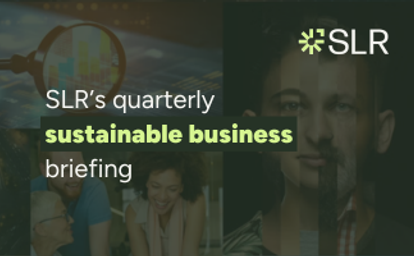
All over for ESG?
- Post Date
- 23 April 2025
- Read Time
- 13 minutes

Rediscovering the business case for corporate sustainability in the new landscape of regulation
The beginning of Donald Trump’s term as 47th president of the United States has been marked by a barrage of executive orders, on everything from birthright citizenship to Arctic drilling to diversity, equity and inclusion (DEI) programmes [1].
The most immediate response by many businesses has been to scrap public DEI commitments – prompted both by a Trump executive order [2] that promises to punish federal contractors deemed to be operating “illegal” DEI programmes, and by a wave of legal challenges and shareholder proposals mounted by an emboldened set of DEI critics. While some companies, such as Costco, Apple, and JPMorgan Chase, have defended [3] their policies (with Costco shareholders roundly voting down [4] an anti-DEI proposal), others [5] have U-turned with remarkable speed.
Meanwhile, the DEI backlash appears to be just the beachhead for an attempted dismantling of the entire corporate environmental, social and governance (ESG) agenda by the new administration. Already, major banks have fled the Net-Zero Banking Alliance [6] over antitrust concerns. Asset managers BlackRock and Vanguard put engagement activities on pause [7] following the release of new guidance from the Securities and Exchange Commission (SEC). And the SEC’s climate disclosure rule [8], which had already floundered in the face of legal challenges, now seems entirely doomed.
Will companies backtrack on other ESG commitments as quickly as they have dropped support for diversity goals? Perhaps – and perhaps the retreat has already begun, with Coca-Cola and Unilever reducing ambition [9] on packaging goals and HSBC [10] and Walmart [11] delaying their climate targets (even as others like General Motors, Ikea and ADM [12] have reaffirmed their commitments). It would be easy to blame this all on hypocrisy – a cowardly flip-flop [13] by CEOs who until recently were only too happy to be characterised as climate crusaders and social justice warriors. But is that the whole story?
Pinning the blame on Trump obscures an uncomfortable truth – that even before the election, many companies’ ESG promises were looking increasingly empty. As ESG hype mounted in 2021-22, so did the temptation to greenwash. Investors overstated the environmental and social impact of their investment strategies, promoting an increasingly blurry definition of ESG investment that promised to deliver reduced risk and higher returns while saving the planet. And many companies were only too ready to jump on the bandwagon, setting lofty ambitions that were far removed from the realities of their business models.
Nowhere is this more evident than in commitments to net zero emissions. With timelines stretching decades into the future, these pledges often rest on the unspoken assumption that massive, coordinated government intervention and technological advancement, at some point between now and 2050, will enable a societal shift to net zero. In this scenario, there is no need for companies to consider how they might need to adapt and transform to enable a net zero world. They simply have to commit, and let the rising tide of the low-carbon transition lift them up.
Research shows that few companies have a plan for reaching their net zero targets, and many remain steadfastly headed in the opposite direction. No wonder that, before this year, many companies were worried not about anti-ESG rhetoric, but about the threat of greenwashing litigation that might challenge their targets’ shaky foundations. Indeed, many companies were concerned that commitments to the Science Based Targets Initiative were unachievable [14]. Many business leaders have surely breathed a sigh of relief in recent months as they dropped their most ambitious pledges.
Where do we go from here? Will ESG survive the next four years? Maybe not – or at least, not the acronym itself, which has become a political football, particularly in the US. But, at the same time, the business drivers remain strong for what – before ESG became a buzzword – was previously known as ‘sustainable business’ or ‘stakeholder capitalism’.
Environmental, social and governance factors continue to pose substantial business risks and opportunities. Companies must still balance the demands of a multitude of stakeholders – politicians, but also customers, employees, shareholders and more. Half of US residents say they have personally experienced the effects of global warming [15], and issues such as fair wages and job creation feature strongly in surveys of the American public. In short, it seems high time that businesses rediscover the business case for sustainability. Below, we explore two potential scenarios for the next four years. In one, companies remain constrained by the Trump administration’s shock and awe [16] approach. In the other, they find a renewed case for sustainable business practices. As ever, it is important to remember that scenarios are plausible futures intended to help us think through different permutations of what could happen – not predictions of exactly what will happen.
Scenario one: The end of ESG – increased global climate risk
In this scenario, we see the Trump administration successfully dismantling the climate and sustainability agenda and/or pushing back against as much regulation as it can in the US. In this scenario, the green agenda loses ground across the world, including in the European Union, as a rightwards shift leads to a focus on ‘competitiveness’ and a new protectionism takes hold in response to US tariffs and trade barriers.
Without political support, corporate commitments are either rowed back or left high and dry. Companies reach the limit of what they can achieve through individual action, but are also unable to work collectively through industry initiatives for fear these will attract antitrust scrutiny.
Examples of how things could play out under this scenario:
- In the US, a rolling back of SEC rules on climate change, a reduction in renewable energy generation, a cut for Federal disaster funding.
- In the EU, a watering down of climate ambitions and policies.
- In the UK, backtracking on the government’s green investment fund.
- The partial disintegration of the Paris Climate Agreement ratchet mechanism, whereby the majority of countries fail to increase their level of ambition and stagnate.
The combined impact of all of these effects is to increase global heating and increase the frequency and severity of extreme weather events, which in turn becomes a significant drag on GDP across the world and makes certain areas uninsurable.
Scenario two: Checks and balances on power – a renewed business case
In this scenario we see the Trump administration have limited success in its efforts to dismantle the climate and sustainability agenda. Some aspects are implemented, such as the withdrawal from the Paris Climate Agreement, while others such as a removal of certain subsidies from the Inflation Reduction Act targeting the green economy are less impactful. This scenario sees other power centres (cities, states, the courts, and corporates) fill the void.
Multinational companies, mindful of the global set of stakeholders to whom they answer and the increasing risk of climate-related disruptions to their business models, rediscover the case for investing in emissions reductions and resiliency across their operations and supply chains. ‘ESG’ is jettisoned but is replaced by a more concrete set of buzzwords – efficiency, infrastructure, resilience.
Examples of how things could play out under this scenario:
- In the US, cities, states and the judicial branch push back against the Trump agenda, stifling its effectiveness. In the end, the ‘bark is worse than the bite’.
- In the EU, there is a pivot towards simplifying some regulations, such as the CSRD / EU Taxonomy regulation, but the substance largely remains intact of flagship aims and policies.
- In the UK, the government largely follows through on its green policies, including the establishment of GB Energy.
- The Paris Climate Agreement remains intact, with a new group of high-ambition countries led by Europe emerging in response to Trump’s withdrawal. China takes a lead in the talks and commands the BRICS and developing country bloc in their level of ambition. Some corporates with high levels of ambition form a new coalition to fill the void.
In this scenario, the increased impetus for other countries to reduce emissions and implement green policies goes someway to offsetting a decline in ambition from the US, but global temperatures continue to riseand the illusive 1.5°C goal remains breached.
Rediscovering the business case for ESG
“Stakeholder capitalism is not about politics,” [17] wrote BlackRock CEO Larry Fink in 2022. “It is not a social or ideological agenda. It is not ‘woke’. It is capitalism, driven by mutually beneficial relationships between you and the employees, customers, suppliers, and communities your company relies on to prosper. This is the power of capitalism.” Fink may now have retreated from the ESG limelight, but his words still carry weight.
Even in the second Trump era, a stakeholder-led approach will pay dividends. Employees want to work for companies that have a clear set of values and stick to them. Investors may change the language and engagement tactics they use, but will continue to monitor company disclosures for insights into risk and resilience, as will business customers. Consumers will continue to look for brands that reflect their values. Sector-level challenges will continue to grow, and businesses will find ways of working together that don’t set antitrust alarm bells ringing.
For a more recent example of a company unafraid to defend the business benefits of a stakeholder-led approach, look no further than Costco. Since its foundation, the company has maintained a reputation for prioritising low prices above all else. So, it’s significant that, when faced with an anti-DEI shareholder proposal, Costco’s board wasted no breath [18] in its defense: “Our success at Costco Wholesale has been built on service to our critical stakeholders: employees, members, and suppliers… We believe that [DEI] efforts enhance our capacity to attract and retain employees who will help our business succeed.” Costco’s shareholders agreed, with more than 98% of shares voting against the proposal.
For company directors and sustainability professionals trying to navigate the shifting tectonic plates of a second Trump term, we make the following recommendations:
- Focus on the fundamentals: What are the factors that will help future-proof your business in an era of increasing weather impacts; energy and resource constraints; political turbulence; and technological and social upheaval? Lofty net zero commitments may be a tough sell, but energy efficiency, supply chain resiliency and crisis management will not. Public DEI goals could attract unwelcome lawsuits, but prioritising employee wellbeing and belonging will help attract and retain talent. And a continued focus on identifying and managing material and emerging environmental, social and governance risks (even if they are not referred to as “ESG”) will help ensure the long-term success of the business.
- Articulate the business case: Providing a sharp rationale for why the business is taking a particular set of actions will help to ward off criticism, rally employees and differentiate from the competition. Take, for example, how Mars updated on progress against its climate goals [19] in 2024 – placing its reductions in context by showing they have not come at the expense of business growth (“in the same period, the Mars business has grown over 60%”) and linking them to supply chain resiliency (“new regenerative agriculture practices to protect the health of the soil, optimize the use of resources, and promote good productivity in grain production”).
- Report what matters: Sustainability reporting has never been so regulated or so scrutinised. Regulatory frameworks such as the European Sustainability Reporting Standards (ESRS) and IFRS S1 and S2 create a baseline of comparability, and may increasingly form a ‘safe haven’ of mandated disclosures for companies that are otherwise nervous about public transparency. But to go beyond compliance and effectively communicate with stakeholders, companies must be able to articulate a set of core values and corporate purpose, linked to a clear explanation of the sustainability issues that impact and are impacted by their unique business model. Transparent and consistent communication will be key to avoiding accusations of hypocrisy and maintaining stakeholder trust.
Advisory Digest
Enjoyed this article? For more like it, get SLR's quarterly sustainable business briefing straight to your inbox.
Sign up
-------------------------------------------
References
[3] https://www.msnbc.com/the-reidout/reidout-blog/trump-dei-companies-target-jpmorgan-goldman-sachs-rcna189196
[4] https://www.cnn.com/2025/01/24/business/costco-dei/index.html
[5] https://www.ft.com/content/668f67d0-eafe-4970-9e9a-210015a8919d
[6] https://www.spglobal.com/market-intelligence/en/news-insights/articles/2025/1/with-jpmorgan-gone-all-major-us-banks-have-now-left-global-climate-alliance-85961423
[7] https://www.reuters.com/sustainability/blackrock-resumes-stewardship-talks-after-reviewing-new-esg-guidance-2025-02-21/
[8] https://www.slrconsulting.com/insights/sec-approves-climate-disclosure-rule/
[9] https://www.packagingdive.com/news/plastic-packaging-sustainability-goals-changed/720372/
[10] https://www.reuters.com/sustainability/hsbc-pushes-back-climate-emissions-target-review-policies-2025-02-19/
[11] https://www.esgtoday.com/walmart-to-miss-2025-2030-climate-targets/
[12] https://www.ft.com/content/f0382962-7751-4238-baf4-e64a89e7488f
[13] https://www.ft.com/content/f0382962-7751-4238-baf4-e64a89e7488f
[14] https://www.edie.net/hundreds-of-businesses-drop-net-zero-commitments-due-to-scope-3-challenges/
[15] https://climatecommunication.yale.edu/wp-content/uploads/2025/02/climate-change-american-mind-beliefs-attitudes-fall-2024.pdf
[16] https://www.axios.com/2025/01/29/trump-executive-orders-first-100-days-history
[17] https://www.blackrock.com/corporate/investor-relations/larry-fink-ceo-letter
[18] https://s201.q4cdn.com/287523651/files/doc_financials/2024/ar/FY24-Proxy-Statement.pdf
[19] https://www.mars.com/news-and-stories/press-releases-statements/mars-delivers-record-carbon-emissions-reduction
Recent posts
-

-

-

Understanding sound flanking: Fire alarm speaker cable conduits in multi-family buildings
by Neil Vyas
View post